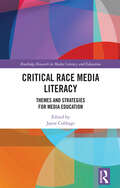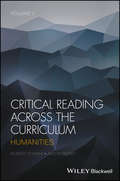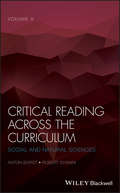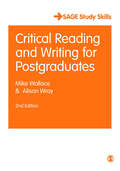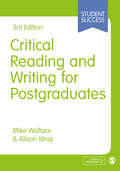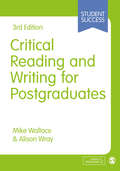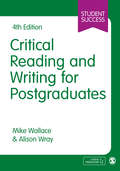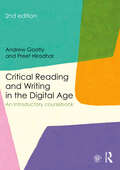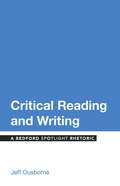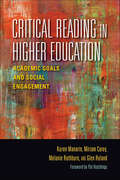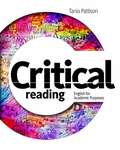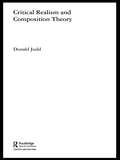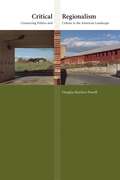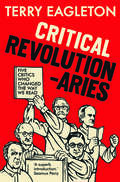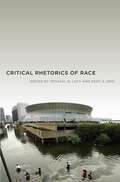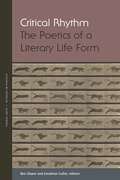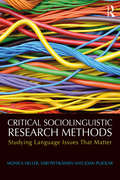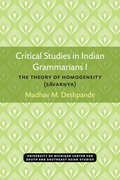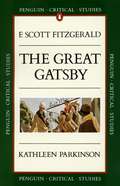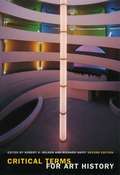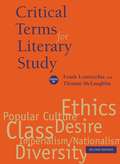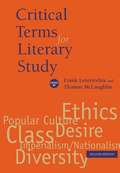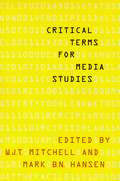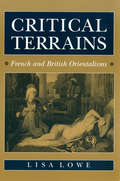- Table View
- List View
Critical Race Media Literacy: Themes and Strategies for Media Education (Routledge Research in Media Literacy and Education)
by Jayne CubbageThis volume offers deeper exploration and advancement of critical race media literacy, a concept which fuses the genres of media literacy and critical media literacy with critical race theory to bring a new and salient frame to the discussion of media literacy across all levels of education in today’s globalized, race-based, and media-saturated climate. Bridging the gap in research that has not addressed the ways in which media is a conduit of racial dialogue and ideology, the book brings together a diverse group of scholars that explore their perspectives on critical race media literacy as it is experienced from the interface and consumption of a variety of media texts and social phenomena. Topics addressed include news literacy, children’s literature, Black political movements, media protests, and ethnic rock—Critical Race Media Literacy addresses these topics within existing media literacy contexts to enhance media literacy scholarship and educational pedagogy. This book will provide a timely and important resource not only for scholars and students of media literacy and media education but also for educators working in diverse learning settings.
Critical Reading Across the Curriculum: Humanities
by Robert DiYanni Anton BorstPowerful strategies, tools, and techniques for educators teaching students critical reading skills in the humanities. Every educator understands the importance of teaching students how to read critically. Even the best teachers, however, find it challenging to translate their own learned critical reading practices into explicit strategies for their students. Critical Reading Across the Curriculum: Humanities, Volume 1 presents exceptional insight into what educators require to facilitate critical and creative thinking skills. Written by scholar-educators from across the humanities, each of the thirteen essays in this volume describes strategies educators have successfully executed to develop critical reading skills in students studying the humanities. These include ways to help students: focus actively re-read and reflect, to re-think, and re-consider understand the close relationship between reading and writing become cognizant of the critical importance of context in critical reading and of making contextual connections learn to ask the right questions in critical reading and reasoning appreciate reading as dialogue, debate, and engaged conversation In addition, teachers will find an abundance of innovative exercises and activities encouraging students to practice their critical reading skills. These can easily be adapted for and applied across many disciplines and course curricula in the humanities. The lifelong benefits of strong critical reading skills are undeniable. Students with properly developed critical reading skills are confident learners with an enriched understanding of the world around them. They advance academically and are prepared for college success. This book arms educators (librarians, high school teachers, university lecturers, and beyond) with the tools to teach a most paramount lesson.
Critical Reading Across the Curriculum: Social and Natural Sciences
by Robert DiYanni Anton BorstProvides educators with practical strategies, tools, and techniques for teaching critical reading skills to students in the social and natural sciences. Strong critical reading skills are an essential part of any student’s academic success. Teaching these vital skills requires educators to develop and implement effective teaching strategies, often based on their own critical reading practices. Critical Reading Across the Curriculum, Volume 2: Social and Natural Sciences provides educators with expert insights, real-world methods, and proven strategies to build critical reading skills in students across disciplines. Drawing from the experience of seasoned classroom practitioners, this book presents a dozen essays that offer various applications of critical reading best practices in fields such as anthropology, biology, economics, engineering, political science, and sociology. Clear, jargon-free chapters identify, explain, and illustrate best teaching practices for critical reading. Containing numerous practical examples and demonstrations, essays written by experts in their respective fields explain what critical reading requires for their discipline, as well as how to teach those skills in the classroom. Every essay includes a host of pedagogical activities, assignments, and projects that can be used directly or adapted for diverse teaching applications. This valuable book helps educators: Develop the skills students need to ask the right questions, consider sources, assess evidence, evaluate arguments, and reason critically Encourage students to practice critical reading skills with engaging exercises and activities Teach students to establish context and identify contextual connections Explain how to read for arguments, including content-based and conceptual arguments Adapt and apply teaching strategies to various curricula and disciplines Critical Reading Across the Curriculum, Volume 2: Social and Natural Sciences is an ideal resource for educators in a wide range of areas, such as college and high school instructors in science and social science disciplines and instructors of graduate education courses.
Critical Reading and Writing for Postgraduates
by Mike Wallace Alison Wray'A systematic, coherent approach to developing critical reading and writing skills that are applicable to a range of different levels of analysis and types of reading and writing tasks. The authors are to be commended for the clarity of their writing and the way scaffolded advice and tasks are integrated into the text. The book could form the core text for a course on critical reading and writing and a useful reference tool for the academic recently entered upon writing for publication. ' - Educate Journal 'A very clear, accessible introduction that will be invaluable to postgraduate students trying to engage with reading and writing in a critical way' - R. M. Lee, Professor of Social Research Methods, Royal Holloway University of London This guide to critical reading and self-critical writing is a 'must-have' resource for postgraduate students and early-career academics. Packed with tools for analysing texts and structuring critical reviews, and incorporating exercises and worked examples drawn from the social sciences, the book offers step-by-step advice on how to: " read any text critically and analyse it in the depth appropriate to one's project " develop a self-critical approach to one's own academic writing " ask questions in order to evaluate authors' arguments " keep a review manageable by using focused review questions " structure a comparative review of multiple texts " build up a convincing argument " integrate critical literature reviews into a dissertation or thesis " make the transition from postgraduate to professional academic writer Essential reading for novice researchers, the book will also be invaluable for supervisors, methods course tutors, and academic mentors who teach and support the development of critical reading and self-critical writing skills.
Critical Reading and Writing for Postgraduates (SAGE Study Skills Series)
by Professor Mike Wallace Professor Alison WrayLecturers, request your electronic inspection copy here Reading critically, and writing using critical techniques, are crucial skills you need to apply to your academic work. Practical and engaging, Critical Reading and Writing for Postgraduates is bursting with tools for analysing texts and structuring critical reviews, helping you to gradually build your skills beyond undergraduate level and gain confidence in your ability to critically read and write. New to this 3rd edition: Introduces a technique for developing critical thinking skills by interrogating paper abstracts Additional diagrams, exercises and concept explanations, enabling you to more easily understand and apply the various approaches A glossary, to help with understanding of key terms. Also new for this edition, a Companion Website provides additional resources to help you apply the critical techniques you learn. From templates and checklists, access to SAGE journal articles and additional case studies, these free resources will make sure you successfully master advanced critical skills. If you need to engage with published (or unpublished) literature such as essays, dissertations or theses, research papers or oral presentations, this proven guide helps you develop a reflective and advanced critical approach to your research and writing. SAGE Study Skills are essential study guides for students of all levels. From how to write great essays and succeeding at university, to writing your undergraduate dissertation and doing postgraduate research, SAGE Study Skills help you get the best from your time at university. Visit the SAGE Study Skills website for tips, resources and videos on study success!
Critical Reading and Writing for Postgraduates (SAGE Study Skills Series)
by Professor Mike Wallace Professor Alison WrayLecturers, request your electronic inspection copy here Reading critically, and writing using critical techniques, are crucial skills you need to apply to your academic work. Practical and engaging, Critical Reading and Writing for Postgraduates is bursting with tools for analysing texts and structuring critical reviews, helping you to gradually build your skills beyond undergraduate level and gain confidence in your ability to critically read and write. New to this 3rd edition: Introduces a technique for developing critical thinking skills by interrogating paper abstracts Additional diagrams, exercises and concept explanations, enabling you to more easily understand and apply the various approaches A glossary, to help with understanding of key terms. Also new for this edition, a Companion Website provides additional resources to help you apply the critical techniques you learn. From templates and checklists, access to SAGE journal articles and additional case studies, these free resources will make sure you successfully master advanced critical skills. If you need to engage with published (or unpublished) literature such as essays, dissertations or theses, research papers or oral presentations, this proven guide helps you develop a reflective and advanced critical approach to your research and writing. SAGE Study Skills are essential study guides for students of all levels. From how to write great essays and succeeding at university, to writing your undergraduate dissertation and doing postgraduate research, SAGE Study Skills help you get the best from your time at university. Visit the SAGE Study Skills website for tips, quizzes and videos on study success!
Critical Reading and Writing for Postgraduates (Student Success)
by Mike Wallace Alison WrayReading critically, and writing using critical techniques, are crucial skills you need to apply to your academic work. If you need to engage with published (or unpublished) literature such as essays, dissertations or theses, research papers or oral presentations, this proven guide helps you develop a reflective and advanced critical approach to your research and writing. New to this edition: Two new chapters on basic and advanced writing skills More advice on self-bias and perception Updates and additional examples throughout Updated online resources providing additional support. A Companion Website provides additional resources to help you apply the critical techniques you learn. From templates and checklists, access to SAGE journal articles and additional case studies, these free resources will make sure you successfully master advanced critical skills.
Critical Reading and Writing for Postgraduates (Student Success)
by Mike Wallace Alison WrayReading critically, and writing using critical techniques, are crucial skills you need to apply to your academic work. If you need to engage with published (or unpublished) literature such as essays, dissertations or theses, research papers or oral presentations, this proven guide helps you develop a reflective and advanced critical approach to your research and writing. New to this edition: Two new chapters on basic and advanced writing skills More advice on self-bias and perception Updates and additional examples throughout Updated online resources providing additional support. A Companion Website provides additional resources to help you apply the critical techniques you learn. From templates and checklists, access to SAGE journal articles and additional case studies, these free resources will make sure you successfully master advanced critical skills.
Critical Reading and Writing in the Digital Age: An Introductory Coursebook
by Andrew Goatly Preet HiradharCritical Reading and Writing in the Digital Age is a fully introductory, interactive textbook that explores the power relations at work in and behind the texts we encounter in our everyday lives. Using examples from numerous genres – such as fiction, poetry, advertisements and newspapers – this textbook examines the language choices a writer must make in structuring texts, representing the world and positioning the reader. Assuming no prior knowledge of linguistics, Critical Reading and Writing in the Digital Age offers guidance on how to read texts critically and how to develop effective writing skills. Extensively updated, key features of the second edition include: a radically revised and repackaged section that highlights the theme of discourses of power and authority and the new possibilities for resisting them; a revamped analysis of the art of communication which has changed due to the advent of new media including Facebook and Wikipedia; fresh examples, exercises and case studies including fan fiction, articles from the BBC, Daily Mail and South China Morning Post, and a selection of international ads for a variety of products; a brand new companion website at www.routledge.com/cw/goatly featuring projects, quizzes and activities for each chapter, a glossary and further reading. Written by two experienced teachers, Critical Reading and Writing in the Digital Age is an ideal coursebook for students of English language.
Critical Reading and Writing: A Bedford Spotlight Rhetoric
by Jeff OusborneCritical Reading and Writing: A Bedford Spotlight Rhetoric helps students with key writing skills. It provides advice on how to read thoughtfully and analytically, with instruction on active reading and note-taking, plus help with analyzing visual and multimodal texts. It also takes students through the writing process, explaining important concepts such as purpose, invention, rhetorical thinking, prewriting, thesis development, and organization, providing support when they need it most. Advice on using sources, revising, and editing will help them enrich, re-see, edit, and format their papers.
Critical Reading in Higher Education: Academic Goals and Social Engagement (Scholarship of Teaching and Learning)
by Glen Ryland Melanie Rathburn Karen Manarin Miriam CareyFaculty often worry that students can't or won't read critically, a foundational skill for success in academic and professional endeavors. "Critical reading" refers both to reading for academic purposes and reading for social engagement. This volume is based on collaborative, multidisciplinary research into how students read in first-year courses in subjects ranging from scientific literacy through composition. The authors discovered the good (students can read), the bad (students are not reading for social engagement), and the ugly (class assignments may be setting students up for failure) and they offer strategies that can better engage students and provide more meaningful reading experiences.
Critical Reading: English for Academic Purposes
by Tania PattisonCritical Reading provides a systematic introduction to the process of analyzing and evaluating a written text. Students develop critical reading skills through analysis of texts from authentic sources (journals, newspapers, magazines, and websites) and a variety of academic dsiciplines. They are encouraged to develop their comprehension and vocabulary skills, while forming a reasoned assessment of the effectiveness and validity of a text.
Critical Realism and Composition Theory (Routledge Studies in Critical Realism)
by Donald JuddThe field of composition theory has emerged as part of the intellectual turmoil and set of pedagogical debates which have beset higher education for the last four decades and is now revolutionizing the theory and praxis of higher education. This volume examines three of the dominant pedagogical theories within composition theory: expressivist, cognitivist, and social-constructivist and builds its critique on the fact that much of modern composition theory has focused on epistemological concerns while neglecting the ontological foundations of that which is being discussed.Critical Realism and Composition Theory offers an alternative approach to teaching composition. This problem-oriented alternative is designed to lead students beyond the abstract, contemplative description of a problem to an expanded understanding that shows that concerns for justice cannot be addressed intellectually without at the same time confronting the practical constraints that limiting powers of social institutions play in both defining a problem and its social solution.
Critical Regionalism
by Douglas Reichert PowellThe idea of "region" in America has often served to isolate places from each other, observes Douglas Reichert Powell. Whether in the nostalgic celebration of folk cultures or the urbane distaste for "hicks," certain regions of the country are identified as static, insular, and culturally disconnected from everywhere else. In Critical Regionalism, Reichert Powell explores this trend and offers alternatives to it.Reichert Powell proposes using more nuanced strategies that identify distinctive aspects of particular geographically marginal communities without turning them into peculiar "hick towns." He enacts a new methodology of critical regionalism in order to link local concerns and debates to larger patterns of history, politics, and culture. To illustrate his method, in each chapter of the book Reichert Powell juxtaposes widely known texts from American literature and film with texts from and about his own Appalachian hometown of Johnson City, Tennessee. He carries the idea further in a call for a critical regionalist pedagogy that uses the classroom as a place for academic writers to build new connections with their surroundings, and to teach others to do so as well.
Critical Revolutionaries: Five Critics Who Changed the Way We Read
by Terry EagletonTerry Eagleton looks back across sixty years to an extraordinary critical milieu that transformed the study of literature Before the First World War, traditional literary scholarship was isolated from society at large. In the years following, a younger generation of critics came to the fore. Their work represented a reaction to the impoverishment of language in a commercial, utilitarian society increasingly under the sway of film, advertising, and the popular press. For them, literary criticism was a way of diagnosing social ills and had a vital moral function to perform. Terry Eagleton reflects on the lives and work of T. S. Eliot, I. A. Richards, William Empson, F. R. Leavis, and Raymond Williams, and explores a vital tradition of literary criticism that today is in danger of being neglected. These five critics rank among the most original and influential of modern times, and represent one of the most remarkable intellectual formations in twentieth-century Britain. This was the heyday of literary modernism, a period of change and experimentation—the bravura of which spurred on developments in critical theory.
Critical Rhetorics of Race (Critical Cultural Communication #12)
by Kent A. OnoAccording to many pundits and cultural commentators, the U.S. is enjoying a post-racial age, thanks in part to Barack Obama's rise to the presidency. This high gloss of optimism fails, however, to recognize that racism remains ever present and alive, spread by channels of media and circulated even in colloquial speech in ways that can be difficult to analyze. In this groundbreaking collection edited by Michael G. Lacy and Kent A. Ono, scholars seek to examine this complicated and contradictory terrain while moving the field of communication in a more intellectually productive direction. An outstanding group of contributors from a range of academic backgrounds challenges traditional definitions and applications of rhetoric. From the troubling media representations of black looters after Hurricane Katrina and rhetoric in news coverage about the Columbine and Virginia Tech massacres to cinematic representations of race in Crash, Blood Diamond, and Quentin Tarantino’s films, these essays reveal complex intersections and constructions of racialized bodies and discourses, critiquing race in innovative and exciting ways. Critical Rhetorics of Race seeks not only to understand and navigate a world fraught with racism, but to change it, one word at a time.
Critical Rhythm: The Poetics of a Literary Life Form (Verbal Arts: Studies in Poetics)
by Ben Glaser and Jonathan CullerThis book shows how rhythm constitutes an untapped resource for understanding poetry. Intervening in recent debates over formalism, historicism, and poetics, the authors show how rhythm is at once a defamiliarizing aesthetic force and an unstable concept. Distinct from the related terms to which it’s often assimilated—scansion, prosody, meter—rhythm makes legible a range of ways poetry affects us that cannot be parsed through the traditional resources of poetic theory.Rhythm has rich but also problematic roots in still-lingering nineteenth-century notions of primitive, oral, communal, and sometimes racialized poetics. But there are reasons to understand and even embrace its seductions, including its resistance to lyrical voice and even identity. Through exploration of rhythm’s genealogies and present critical debates, the essays consistently warn against taking rhythm to be a given form offering ready-made resources for interpretation. Pressing beyond poetry handbooks’ isolated descriptions of technique or inductive declarations of what rhythm “is,” the essays ask what it means to think rhythm.Rhythm, the contributors show, happens relative to the body, on the one hand, and to language, on the other—two categories that are distinct from the literary, the mode through which poetics has tended to be analyzed. Beyond articulating what rhythm does to poetry, the contributors undertake a genealogical and theoretical analysis of how rhythm as a human experience has come to be articulated through poetry and poetics. The resulting work helps us better understand poetry both on its own terms and in its continuities with other experiences and other arts.Contributors: Derek Attridge, Tom Cable, Jonathan Culler, Natalie Gerber, Ben Glaser, Virginia Jackson, Simon Jarvis, Ewan Jones, Erin Kappeler, Meredith Martin, David Nowell Smith, Yopie Prins, Haun Saussy
Critical Sociolinguistic Research Methods: Studying Language Issues That Matter
by Sari Pietikäinen Monica Heller Joan PujolarCritical Sociolinguistic Research Methods is a guide to conducting concrete ethnographic and discourse analytic research projects, written by top scholars for students and researchers in social science fields. Adopting a critical perspective focusing on the role of language in the construction of social difference and social inequality, the authors walk the reader through five key moments in the life of a research project: composing research questions, designing the project, doing fieldwork, performing data analysis and writing academic texts or otherwise engaging in conversation with different types of social actors about the project. These moments are illustrated by colour-coded examples from the authors’ experiences that help researchers and students follow the sequential stages of a project. Clear and highly applicable, with a detailed workbook full of practical tips and examples, this book is a great resource for graduate-level qualitative methods courses in linguistics and anthropology, as well as methods courses in the humanities and social sciences that focus on the role of language in research. It is a timely text for investigating language issues that matter and have consequences for people’s lives.
Critical Studies in Indian Grammarians I: The Theory of Homogeneity (SĀVARṆYA) (Michigan Series In South And Southeast Asian Languages And Linguistics)
by Madhav M. DeshpandeIn the historical study of the Indian grammarian tradition, a line of demarcation can often be drawn between the conformity of a system with the well-known grammar of Pāṇini and the explanatory effectiveness of that system. One element of Pāṇini’s grammar that scholars have sometimes struggled to bring across this line of demarcation is the theory of homogeneity, or savarṇa, which concerns the final consonants in Pāṇini’s reference catalog, as well as phonetic similarities between sounds. While modern Sanskrit scholars understand how to interpret and apply Pāṇini’s homogeneity, they still find it necessary to unravel the history of varying interpretations of the theory in subsequent grammars. Madhav Deshpande’s The Theory of Homogeneity provides a thorough account of the historical development of the theory. Proceeding first to study this conception in the Pāṇinian tradition, Deshpande then passes on to other grammatical systems. Deshpande gives attention not only to the definitions of homogeneity in these systems but also the implementation of the theory in those respective systems. Even where definitions are identical, the concept may be applied quite differently, in which cases Deshpande examines by considering the historical relationships among the various systems.
Critical Studies: The Great Gatsby
by Kathleen ParkinsonKathleen Parkinson places this brilliant and bitter satire on the moral failure of the Jazz Age firmly in the context of Scott Fitzgerald's life and times. She explores the intricate patterns of the novel, its chronology, locations, imagery and use of colour, and how these contribute to a seamless interplay of social comedy and symbolic landscape. She devotes a perceptive chapter to Fitzgerald's controversial portrayal of women and goes on to discuss how the central characters, Gatsby and Nick Carraway, embody and confront the dualism inherent in the American dream.
Critical Terms for Art History (2nd edition)
by Robert S. Nelson Richard Shiff"Art" has always been contested terrain, whether the object in question is a medieval tapestry or Duchamp's Fountain.
Critical Terms for Literary Study
by Lentricchia, Frank and McLaughlin, ThomasSince its publication in 1990, Critical Terms for Literary Study has become a landmark introduction to the work of literary theory—giving tens of thousands of students an unparalleled encounter with what it means to do theory and criticism. Significantly expanded, this new edition features six new chapters that confront, in different ways, the growing understanding of literary works as cultural practices. These six new chapters are "Popular Culture," "Diversity," "Imperialism/Nationalism," "Desire," "Ethics," and "Class," by John Fiske, Louis Menand, Seamus Deane, Judith Butler, Geoffrey Galt Harpham, and Daniel T. O'Hara, respectively. Each new essay adopts the approach that has won this book such widespread acclaim: each provides a concise history of a literary term, critically explores the issues and questions the term raises, and then puts theory into practice by showing the reading strategies the term permits. Exploring the concepts that shape the way we read, the essays combine to provide an extraordinary introduction to the work of literature and literary study, as the nation's most distinguished scholars put the tools of critical practice vividly to use.
Critical Terms for Literary Study (2nd edition)
by Frank Lentricchia Thomas MclaughlinAn expanded introduction to the work of literary theory covering the concepts that shape the way we read, with 28 essays written by a plethora of distinguished scholars.
Critical Terms for Media Studies
by W. J. T. Mitchell Mark HansenCommunications, philosophy, film and video, digital culture: media studies straddles an astounding array of fields and disciplines and produces a vocabulary that is in equal parts rigorous and intuitive. Critical Terms for Media Studiesdefines, and at times, redefines, what this new and hybrid area aims to do, illuminating the key concepts behind its liveliest debates and most dynamic topics. Part of a larger conversation that engages culture, technology, and politics, this exciting collection of essays explores our most critical language for dealing with the qualities and modes of contemporary media. Edited by two outstanding scholars in the field, W.J.T. Mitchell and Mark B.N. Hansen, the volume features works by a team of distinguished contributors.
Critical Terrains: French and British Orientalisms
by Lisa LoweExamining and historicizing the concept of "otherness" in both literature and criticism, Lisa Lowe explores representations of non-European cultures in British and French writings from the eighteenth through the twentieth century. Lowe traces the intersections of culture, class, and sexuality in Lady Mary Wortley Montagu’s Turkish Embassy Letters and Montesquieu’s Lettres persanes and discusses tropes of orientalism, racialism, and romanticism in Flaubert. She then turns to debates in Anglo-American and Indian criticism on Forster’s Passage to India and on the utopian projection of China in the poststructuralist theories of Julia Kristeva and Roland Barthes and in the journal Tel Quel.
